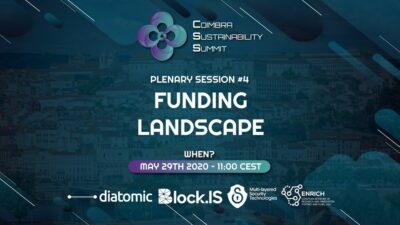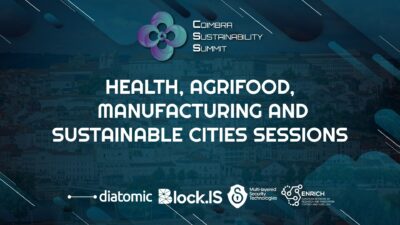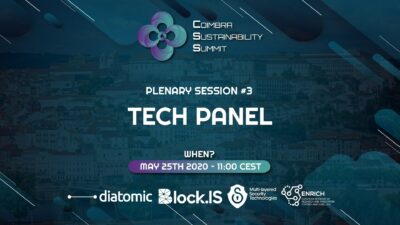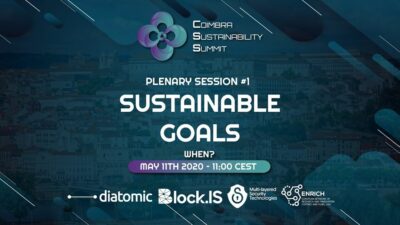Recap of Coimbra Sustainability Summit Plenary Session 2 – Holistic approach, partnerships & ethics
The second plenary session “Holistic Approach, Partnerships & Ethics” kicked off with the welcome speech by P2’s moderator António Damasceno, Block.IS Coordinator at F6S, providing a vision of the CSS on how Sustainable Development Goals from the United Nations & Green Deal from the EU can inspire technology to create value for society. He pointed out the ecosystem of CSS: Inspiring Leaders, Researches & Companies, Investors and European Commission as well as the goals to inspire innovative approaches, foster new partnerships, and deliver better value.
Moreover, the welcome speech involved the introduction of P2 speakers to the audience, agenda of the CSS where the previous session P1 – Sustainable Goals moderated by Dr. Mladen Radišić was wrapped up as well as the program for the upcoming sessions, inviting attendees to seize the opportunity to register and join us in our journey.
Mr. Daniel Mogefors opened the P2 session with his presentation as a first speaker. He is Program Manager for the Global Insight Fellowships at the University of Oxford and the Activity Line Coordinator for the EIT Health Fellowship Network. Daniel has an academic background in mechanical engineering and business management and worked with product development in the automotive industry before entering the field of health technology innovation. Daniel has taught the Needs-Led Innovation approach across Europe, for example in industry training programs. He shared
his thoughts on the Needs-led Innovation journey on a theoretical level and how it applied at Oxford to be Global Insight Fellowships. He highlighted the market needs and demands as one of the main drivers of successful innovation and announced that the failure to meet that needs is a great way to fail as a start-up not just in the health sector but in general. Namely, as most of his career was interwoven with health, he focused on the big challenges and pitfalls particularly in that sector. Daniel’s presentation was really intuitive and noteworthy from the beginning until the end explaining
the successfully running Global Insight Fellowship program at the University of Oxford. He announced that there is a high need of technologies in the aforementioned sector which is an open gate for new market opportunities for the innovators.
The session continued by the presentation of Ms. Sille Sepp as our second speaker in a row. Sille is a Community Lead at MyData Global, Finland. The purpose of MyData Global is to empower individuals by improving their right to self-determination regarding their personal data. Sille’s background is related to social studies and her interest lays in the implementation of a human-centric approach to personal data, specifically in the urban context. Her presentation was about addressing the needs of each stakeholder in the data economy and intersections between data, technology, ethics, and how to all make that work in order to develop better services. Furthermore, her presentation tackled the MyData approach and synergise with the topic of the P2 Holistic approach, partnerships, and ethics.
Mr. Licinio Roque closed the session as a third speaker. Licínio Roque started his research with a socio-technical perspective on IS Development methodology, focusing on the role of context in development processes. His twenty years of research focused on Participatory Media contribute to
informing the design and evaluation of computational objects and services, that empower generative appropriations in collaborative phenomena. Principal researcher in several projects gave him a unique interdisciplinary perspective across the areas of Information Systems, HCI, and Design. He coordinates Design programs and the Information Systems Group at the University of Coimbra, where he develops several teaching and research activities with the focus on designing sustainable transitions in sociotechnical systems. His intention was to talk about Sustainable by Design and to
bring the perspective of design on the floor. He announced the wrong thinking of most of the people about design as an art which is producing only visual results for the purpose of communication and products. Therefore, according to his experience over the years in workload control management, e-governance and digital transformation in the public and social sectors, social innovation through creative cultural industries, end-user development and generative techniques, play-based research and game design in multi-sensory stimulation and design insights for data science instruments, Licinio explained the role of design as a much broader than that.
The presentations were followed by a Q&A session between our participants and the CSS panelists including everyone in the conversation using the Poll Everywhere through pollev.com interactive concept, which led to fruitful discussions and useful conclusions on the relevant topics to our CSS participants.
In the end, the CSS’s P1 session also included Brokerage session which was the period where all participants who have registered for this opportunity had 2 minutes to in brief present themselves, their organization, and what are they looking for. The Brokerage session was a chance for the participants to network as well as business opportunities within their industries and sectors that go beyond CSS. This is one of the key aspects of such events because it provided our participants with a great opportunity to interact by facilitating quality networking and raising the potential for new business deals and ventures.
We can’t wait to see you on Friday, 22nd of May at 11 CEST, where parallel sessions of Health, Agrifood, Manufacturing, and Sustainable cities will take place! Our great speakers are going to give you the answer to the question What are the Needs of those 4 sectors?
Save your spot for the upcoming sessions!




